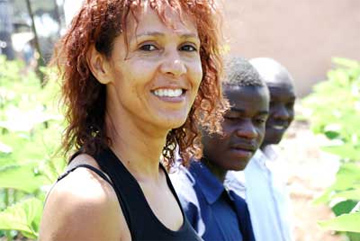

South Africa's first GROW BIOINTENSIVE Teaching Centre was started at CIDA City

Campus in 2007 by Sandile Nkosi and Simphiwe Tinini and was featured on 2008 cover of Ecology Action's Seed Catalogue (pictured left) which is mailed to subscribers in over 120 countries.
Click on images to enlarge.
We are very excited to be able to offer a 5 day workshop at Ezemvelo in September on GROW BIOINTENSIVE agriculture by
John Jeavons.For over 30 years Jeavons has been a trail blazer in the field of sustainable agriculture, developing a mini farming system known as
GROW BIOINTENSIVE.This method has been extraordinarily successful in over 141 countries worldwide.
"There are probably a billion people in the world who are malnourished. The Jeavons approach could enable that segment of the population to feed itself adequately for the first time ever. That would be a remarkable development in this world, and would do more to solve the problems of poverty, misery and hunger than anything else we've done."-
Former U.S. Secretary of Agriculture Bob BerglandIn Africa Kenya is a leader in this field. 2008 was a record year with over 20,000 Kenyan farmers attending 5 day workshops taught by graduates with 2 years training from
Manor House Agricultural Centre. See:
2008 Biointensive Report in KenyaA leading teacher and proponent in Kenya is Joshua Machinga. He has taught over 37,000 farmers in this method at the
Common Ground project. Their website provides a great online resource for farmers at:
Village Volunteers: Sustainable Village LibraryEzemvelo is offering special 5 day accommodation packages including all meals and course tuition as follows:
R/person
Rhino House (2 persons/ room) 3250
Legae-Chalets (3 persons / chalet) 3175
Family Huts (3 persons/room) 3025
Group rates:
Hikers Huts (16 per dorm room) 2850
Eland Lapa (8 per dorm room) 2850
Caravan & Camping (max 6 per stand) 2700
Workshop and meals only 2300
Accommodation is limited and will be allocated on a first come first served basis with full payment.
For bookings and further information e-mail: horsfield@lisco.com or ezemvelo@telkomsa.net
TEL: 013 680 1399 / 083 440 5886 /
083 655 3638 / 083 287 6832
See our more recent post here:
http://ezemvelo.blogspot.com/2009/05/food-and-our-future-hope-and-solutions.html
 Traditional practices increase yield by 128 per cent in east Africa, says UN
Traditional practices increase yield by 128 per cent in east Africa, says UN













